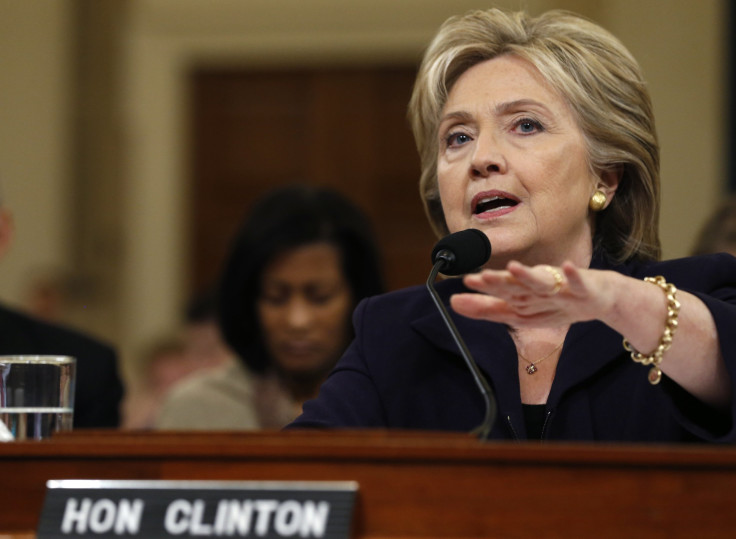Benghazi Hearing Explained: Read Hillary Clinton's Most Important Testimony Responses

Hillary Clinton finally finished testifying Thursday night after an 11-hour hearing about the 2012 Benghazi, Libya, terrorist attacks that left four Americans dead. "With that, we will be adjourned," said South Carolina Rep. Trey Gowdy, chairman of the investigating committee. The daylong hearing did not produce much political news, but there were several key moments.
Sidney Blumenthal Repeatedly Addressed In Questioning
Republicans repeatedly grilled Clinton on her relationship with unofficial adviser Sidney Blumenthal, with whom she exchanged a number of emails about Libyan affairs.
"Madame Secretary, Mr. Blumenthal wrote you 150 emails. It appears from the materials that we've read all of those reached your desk," Rep. Mike Pompeo, R-Kan., said. "Can you tell us why security requests from your professionals ... None of those made it to you. But a man who was a friend of yours who'd never been to Libya, didn't know much about it ... every one of those reports that he sent on to you that had to do with situations on the ground in Libya, those made it to your desk."
Clinton told the committee that the emails were unsolicited and defended the relationship as correspondence between friends. "We took advantage of every person we could with expertise to guide our decisions," Clinton said.
The subject of Clinton's private email server, which has dogged her for months, wasn't raised until hours into the hearing.
Committee Republicans Question Whether Clinton Acted For Political Gain
Rep. Peter Roskam, R-Ill., accused Clinton of being self-serving in her Libyan policy, citing emails between the former U.S. secretary of state [2009-13] and her staff. “You were thinking about credit for you, isn’t that right?” Roskam said.
Clinton denied his allegations and said that she was acting with the American people in mind.
"It certainly was something that I came to believe was in the interests of the United States to join with our NATO allies and our Arab partners in doing," Clinton said. "The decision, as all decisions in any administration, was made by the president. So the president deserves the historic credit. What role I played, I'm very grateful to have had that chance, and I'm, you know, very convinced that it was the right thing to do."
Her response left Roskam unconvinced. He called her behavior a "victory lap."
"Well, you just recited the Clinton doctrine to us, and let me tell you what I think the Clinton doctrine is," Roskam said. "I think it's where an opportunity is seized to turn progress in Libya into a political win for Hillary Rodham Clinton, and at the precise moment when things look good, take a victory lap, like on all the Sunday shows three times that year before [former Libyan leader Moammar] Gadhafi was killed, and then turn your attention to other things."
Tensions Rise Between Trey Gowdy, Elijah Cummings
Not even halfway through the hearing, there was a heated exchange between two committee members: Chairman Gowdy, a Republican, and Ranking Democrat Elijah E. Cummings of Maryland. Cummings pressed Gowdy about why he would not release transcripts of the deposition conducted with Blumenthal.
"You said from the beginning we want the truth, the whole truth and nothing but the truth," Cummings said. "Why don't we just put the entire transcript out there and let the world see it? What do you have to hide?"
Gowdy fired back that Blumenthal would be further addressed after the lunch break. "If you think we've heard about Sidney Blumenthal, wait for the next round," Gowdy said.
'I've Lost More Sleep Than All Of You Put Together'
Rep. Adam Schiff, D-Calif., gave Clinton the opportunity to share how she felt about Republicans suggesting that she had not done enough to protect Americans in Benghazi.
Clinton recounted with remorse the events that unfolded:
“It’s a very personally painful accusation. It has been rejected and disproven by nonpartisan, dispassionate investigators but nevertheless having it continued to be bandied around is deeply distressing to me. I would imagine I've thought more about what happened than all of you put together. I’ve lost more sleep than all of you put together. I have been wracking my brain about what more could have been done or should have been done, and so when I took responsibility, I took it as a challenge and an obligation to make sure before I left the State Department that what we could learn as I’m sure my predecessors did after Beirut and after Nairobi and Dar es Salaam and after all of the attacks on our facilities, I think all of them, Republican and Democrat alike ... said, 'OK, what must we do better?'"
Clinton Slams Republicans For Trying To Weave A Narrative
In one heated moment, Clinton chided Rep. Jim Jordan for, she said, attempting to misconstrue her words to "fit his narrative." Jordan had been pressing Clinton to explain why the Obama administration claimed the attacks were related to a protest over an anti-Muslim YouTube video.
"I'm sorry that it doesn't fit your narrative, congressman," she said. "I can only tell you what the facts were. And the facts, as the Democratic members have pointed out in their most recent collection of them, support this process that was going on, where the intelligence community was pulling together information."
After the hearing ended, Gowdy said that the day's testimony had not produced much new information. But he said there were further witnesses to call and that the investigation would continue.
On social media, the reaction was largely that the hearings had lasted too long -- and produced little result. Many commentators said Clinton had showed toughness and resilience just by enduring the questions -- if not precisely answering them -- and many tweets and memes reflected viewers' exasperation with the process.
© Copyright IBTimes 2025. All rights reserved.






















